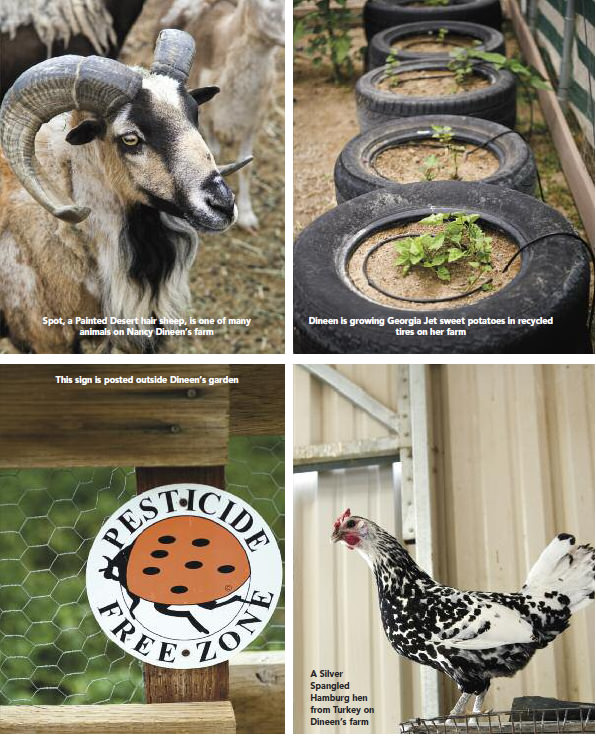meet the farmer
TURN ON THE WATERWORKS
Reno farmer explores the wonders of soil-less growing.
WRITTEN BY BARBARA TWITCHELL
PHOTOS BY CANDICE NYANDO
Jeannie Damonte is working at the computer in her office when a bumblebee flies by. She’s unfazed. It’s business as usual when your desk is only about 40 feet from a beehive and the bee just happens to be a co-worker of sorts.
Damonte is the owner of Sterling Farms, located in the heart of Reno. The farm is a most unusual one, in that it is totally enclosed in a 6,000-square-foot concrete and metal warehouse and does not use a speck of soil or a ray of sunshine. Yet her crops, lush and green, would be the envy of any traditional farmer.
The secret to this amazing agricultural adventure is one word: hydroponics.
Going Dirt-less
Hydroponics is a system of growing plants in an inert medium, water, and a nutrient solution. Since the plants get all of the necessary nutrients in the water, soil is completely unnecessary.
Frustrated with the challenges of outdoor gardening in Northern Nevada, Damonte became fascinated with the idea of hydroponics about five years ago. She started reading, researching, and attending workshops to learn all she could about the process.
Already the owner of a successful medical transcription business for more than 20 years, Damonte is no stranger to entrepreneurial projects. It didn’t take long before she started to see commercial possibilities for indoor hydroponic farming. Suddenly, her hobby became a new business venture. It was a natural fit for her, she says.
“My education was in health science,” she says. “I love gardening, and I have always been self-employed, so I thought, ‘I’m going to give this a try and see if it can work.'”
She started her first hydroponic crop in her barn, but soon realized that she needed more space and a reliable power source for the heat and artificial light required by year-round indoor farming. The logical decision was to move her operation to a warehouse. Row after row of basil, eggplants, peppers, wheatgrass, and barley fodder now fill the huge expanse.
So far her plan seems to be working. She has a growing list of local restaurants, grocers, and ranchers that she supplies with fresh vegetables, herbs, and livestock feed — all free from GMOs, contaminants, pesticides, and herbicides. In fact, the demand for her produce currently exceeds her supply.
However, she is the first to admit that it wasn’t easy. The learning curve is steep and much of it has been through trial and error. The bees are a prime example. In the beginning, her eggplant specimens were huge, healthy, and full of blooms, but she never got any fruit. It turns out that she needed to put a beehive in the warehouse to pollinate those plants. Major lesson: While you don’t need dirt, you may still need bees.
It’s all like a grand science project for her. She is continually experimenting with different growing media, various types of light sources, and assorted nutrient mixtures, trying to determine the optimal ones for each plant variety.

A Growing Industry
Right now, Damonte believes she has one of the only commercial indoor hydroponic farms in the area. However, she sees a blossoming future for the industry. Without the need for soil, hydroponic farming can be done virtually anywhere. Exact figures vary, but most studies indicate that it uses significantly less water than traditional farming, since there is no runoff and less evaporation, and all water used in the process can be recycled.
Additionally, since plants don’t have to put energy into growing extensive root systems to search for nutrients in the soil, they grow faster and produce larger yields. And because the environment is so controlled, there are fewer problems with pests, diseases, weeds, and contaminants.
And then, of course, there is the weather factor. Farming indoors means that crops can be grown year-round. There is no longer any concern about extreme temperatures, snow, hail, wind, or a short growing season — in other words, Northern Nevada’s typical agricultural challenges.
Damonte is a true believer and is happy to encourage others, whether casual gardener or large-scale farmer, to jump in the hydroponic pool with her.
Just don’t forget to include the bees.
As a frustrated Northern Nevada gardener, Reno writer Barbara Twitchell is intrigued by the prospect of indoor hydroponic gardening. Not getting dirt stuck under her fingernails also is appealing, she admits.
Resources
For details on Sterling Farms, visit http://www.Sterlingfarmshydroponics.com.


